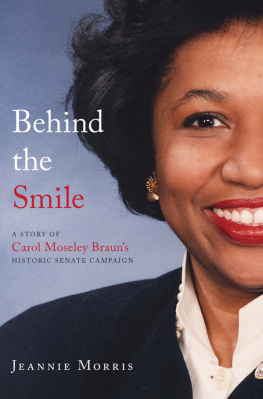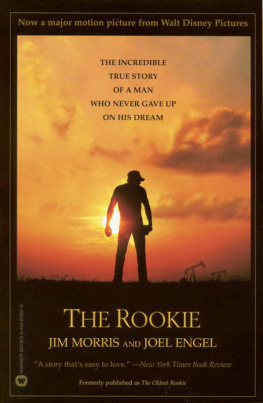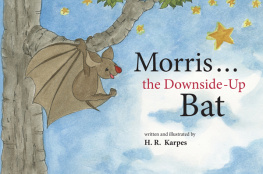

Copyright 2015 by Jeannie Morris
All rights reserved. No part of this book may be reproduced or transmitted in any form or by any means, electronic or mechanical, including photocopying, recording, or by any information storage and retrieval system, without express written permission from the publisher.
Library of Congress Cataloging-in-Publication Data
Morris, Jeannie.
Behind the smile : a story of Carol Moseley Brauns historic senate campaign / Jeannie Morris.
pages cm
Summary: Memoir by a Chicago journalist recounting the 1992 US Senate campaign of Carol Moseley Braun-- Provided by publisher.
Includes bibliographical references and index.
ISBN 978-1-57284-759-0 (e-book)
1. Moseley-Braun, Carol, 1947- 2. Women legislators--United States--Biography. 3. African American legislators--Biography. 4. Democratic Party (U.S.)--Biography. 5. United States. Congress. Senate--History--20th century. 6. Political campaigns--United States--History--20th century. 7. United States--Politics and government--1989-1993. 8. Illinois--Politics and government--20th century. I. Title.
E840.8.M67M67 2015
328.73092--dc23
[B]
2015014510
10 9 8 7 6 5 4 3 2 1 15 16 17 18
Midway is an imprint of Agate Publishing. Agate books are available in bulk at discount prices. For more information, go to agatepublishing.com.
I know that every person who participated in this unique experience would have her or his version of events, but I offer my view and dedicate this story to all the members of the Moseley Braun primary and general-election campaigns who embodied the word dedication.
And to Carol herself, the magnet that drew them in.
All normal humans are both ignoble and noble, often in close alternation, sometimes simultaneously.
The instability of the emotions is a quality we should wish to keep. It is the essence of the human character, and the source of our creativity. We need to understand ourselves in both evolutionary and psychological terms in order to plan a more rational, catastrophe-proof future. We must learn to behave, but let us never even think of domesticating human nature.
E. O. Wilson, The Meaning of Human Existence
Contents
Democracy only works when the people we elect to high public office remember that they are the servantsnot the mastersof the people.
CAROL MOSELEY BRAUN
Announcing her run for the US Senate
Carol Moseley Braun represents the redemption of the American political process.
SENATOR TOM HARKIN, IOWA
Its Airplane! The campaign movie!
DAVID AXELROD
What a scene that must have been inside the campaign.
TOM HARDY
Chicago Tribune, December 20, 1992
Chicago. April 1992.
Realizing that there was a good chance history was about to be made in Illinois in November, I scribbled a note to Carol Moseley Braun, currently the Cook County recorder of deeds, suggesting that she allow me to follow her campaign for the US Senate to document it for a book. In 92, Carol, like a record number of women candidates born of the emotional maelstrom that followed the hearings to confirm Clarence Thomas as a Supreme Court justice, had just defeated (the unbeatable) Democratic senator Alan Dixon in the Illinois primary. Dixon was one of only two Democrats in the Senate who had voted to confirm Judge Thomas.
That was more than two decades ago.
Everything changes.
The past 20 years have seen a technological tsunami; vastly increased globalization; and a couple of recessions, the most recent dubbed the Great. In addition, there was a Supreme Court decision inappropriately known as Citizens United, a ruling that became a factor in the increased wealth and insularity of Washington, where inhabitants engage in incestuous rituals of self-perpetuation and where, according to New York Times chief national correspondent Mark Leibovich, cowardice is rewarded every step of the way.
And nothing changes.
Some progress has been made for sure; however, the politics of race and gender that not only inspired the Carol Moseley Braun campaign but also, in the end, came very close to destroying it, are with us still. If anything, when it comes to race especially, we are even more distressed.
But leaving aside the countless other issues that remain to haunt us today, Carols election to the Senate in 1992 was a significant landmark in the continuum of African American progress marked 50 years earlier, in 1963, by Dr. Martin Luther King Jr. as he stood before the Lincoln Memorial and shared his dreams of what real freedom would mean for all Americans. Kings passionate plea remained unfulfilled a full 100 years after President Lincoln had signed the Emancipation Proclamation. Following Carol Moseley Brauns election by 16 yearsand after serving as an Illinois senator himselfBarack Obama became president of the United States. In Chicago, as a South Side community organizer and as a strong supporter and, importantly, a keen observer of the Moseley Braun campaign, Obama credits Carol with showing the way.
My guess is that Obama admired Carols inclusive, nonthreatening campaign style, but he was clearly referring to their shared racial heritage. The fact that Carol was African American was also important to me as a citizen who still dreams that one day our political institutions will be representative of all the people of the United States. But Carol was also a feminist and a sensible progressive who walked the talk. I listened to her during the primary; I studied her record during her years in the Illinois legislature. She represented me; politically, she was me. She was so smart and so candid, and her smile just lit up the world. Like millions in Illinois and, eventually, the nation, I fell in love.
It wasnt fair. We invest too much in our candidates. We project our own hopes and dreams upon them without regard to the political realities they will be facing and without taking into consideration that these people too have needs, priorities, weaknesses, and especially histories that might not match ours. And so for me, that campaign trail in 1992 was a march toward understanding, first of a single, fragile human being; second, it was an immersion experience in our democracys political process, a process that although it ultimately must address real people with real issues, deliberately obscures reality.
During his 2008 campaign, Obama famously shouted, We are the ones weve been waiting for! Well, no, not actually. You were supposed to be perfect.
I was to learn that nobody could be more real than Carol Moseley Braun: a mother, divorced, smart, insecure, bold, needy, politically courageous, personally vulnerable, accomplished, tired, fun, generous. And black. Carol would become only the second African American since Reconstruction and the first African American woman to be elected to the US Senate. As a white supporter, this was a plus for me for the reason already stated; of course the candidates color was historically significant, yet for me personally, it was essentially cosmetic. This was a candidate I could believe in, but the woman within the candidate taught me how very complicated it was to be Carol Moseley Braun from the South Side of Chicago, how painfully significant cosmetics are in our culture. Although this is an existential truth, when it came to politics, Carol herself identified more with her femaleness than her blackness. In her battle to rise from state representative to US senator, whenever she was dismissed or demeaned, she believed it was more because she was a woman than an African American.
Next page














